Your customers are asking ChatGPT and Gemini for recommendations instead of just using Google.
Traditional SEO tools can't tell you if your brand is mentioned in these crucial, high-intent conversations. This isn't about keyword rankings anymore; it's about getting cited as the definitive answer. Standard visibility scores are obsolete if they don't track your presence inside AI models.
You need a new way to measure what matters.
The pace of change is accelerating, with developments like Google Gemini's Flash Image Breakthrough signaling how AI will soon interpret and present visual information within search. This further complicates visibility tracking. Your brand must appear in text-based answers and be associated with relevant visual queries. This guide cuts through the noise and moves beyond outdated metrics.
I'm not just listing tools. I'm breaking down the most accurate AI visibility metrics software based on what they actually measure, how they get their data, and where they fall short. You'll learn the difference between tracking AI Overviews and true LLM citations.
1. AI SEO Tracker
AI SEO Tracker is engineered specifically for the new frontier of AI-driven search. While traditional SEO tools remain fixated on Google's search results pages, this tool provides visibility into where your brand appears in answers generated by major large language models (LLMs) like ChatGPT, Gemini, and Perplexity. It offers one of the most accurate solutions by directly tracking brand citations, content sourcing, and competitor mentions within AI-generated responses.
This focus allows marketing teams to move beyond conventional SERP analysis and understand their true footprint in the emerging AI answer ecosystem.
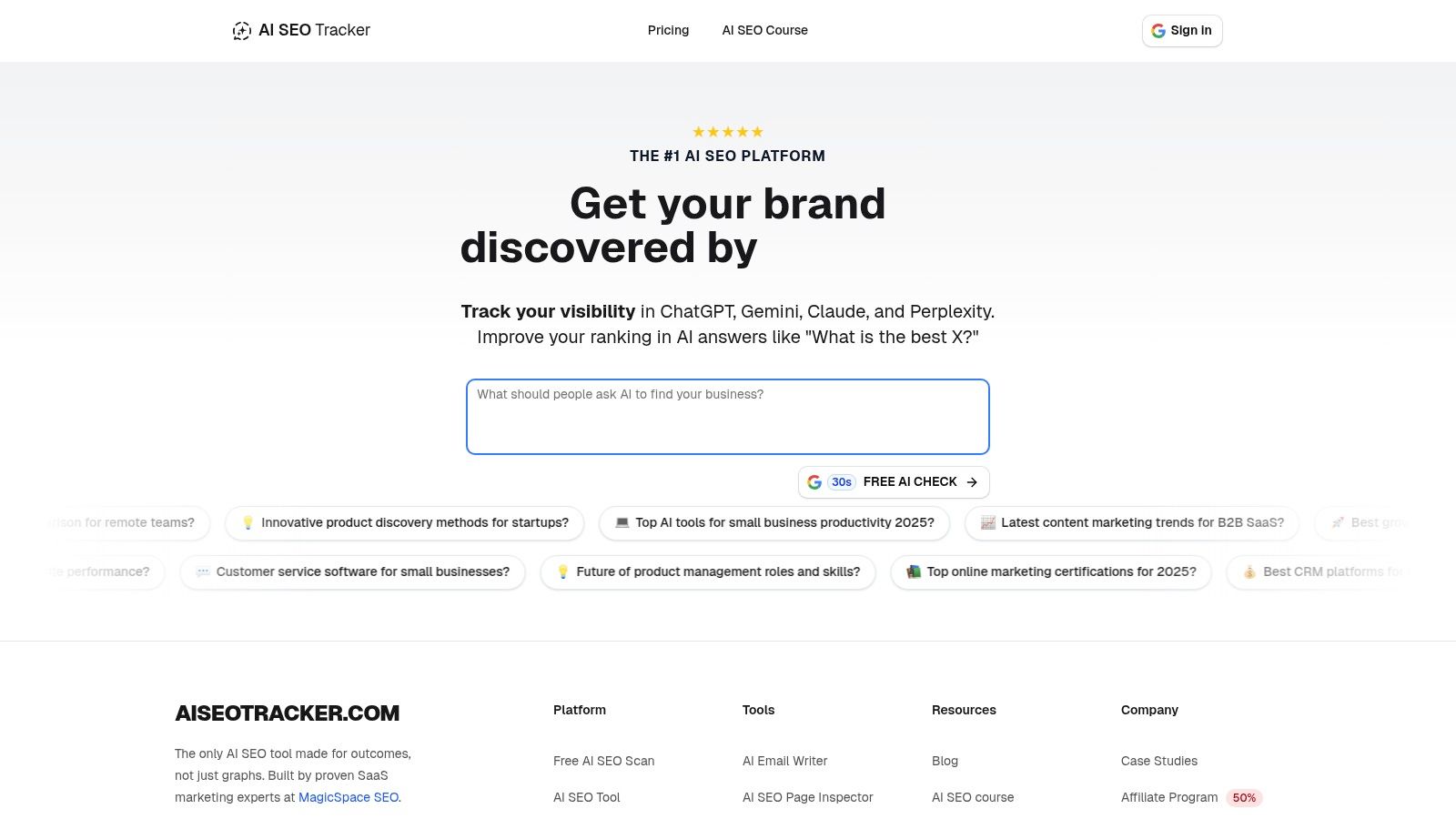
Key Capabilities and Use Cases
The platform's standout feature is its AI SEO Page Inspector. This tool moves beyond simple keyword tracking and analyzes any URL for its "AI-readability." It identifies specific content gaps or structural issues, such as dynamic pricing tables or poorly formatted FAQs, that prevent LLMs from accurately parsing and citing your information.
- Mini Case Study: A B2B software company found their feature comparison page was never cited by AI models. The Page Inspector revealed the content was hidden behind interactive JavaScript tabs. By converting it to a static, scannable HTML table, they saw a 40% increase in citations for competitive queries within two months.
The dashboard provides a clear view of your AI Share of Voice, tracking how often you are mentioned versus competitors for key prompts. This allows you to measure progress and pinpoint which strategic content initiatives are successfully influencing the AI models. For more on this, check out a comprehensive list of the best SEO AI tools.
Pros:
- Provides exclusive visibility into brand appearances across major AI LLMs.
- Identifies the exact customer prompts and high-intent questions driving visibility.
- AI SEO Page Inspector offers actionable plans to improve content AI-readability.
- Tracks AI share of voice and competitor performance with robust dashboards.
Cons:
- Pricing is not publicly listed, requiring a direct inquiry.
- The tool is highly specialized for SaaS and B2B tech, which may limit its utility for e-commerce or local businesses.
You can get more information on their website to learn more about AI SEO Tracker.
Website: aiseotracker.com
2. Ahrefs
Ahrefs has expanded its legendary SEO toolkit to address the rise of generative search. Its core strength lies in combining its powerful web crawler and massive backlink index with emerging AI analytics. This makes it an ideal solution for teams that need to manage holistic search visibility, not just the AI component in isolation.
The standout feature is Brand Radar, which specifically monitors how your brand and website appear in Google AI Overviews, ChatGPT, and Perplexity. This is integrated directly into its established Rank Tracker, allowing you to see where you rank in classic SERPs and where you are cited in AI-generated answers, all in one dashboard.
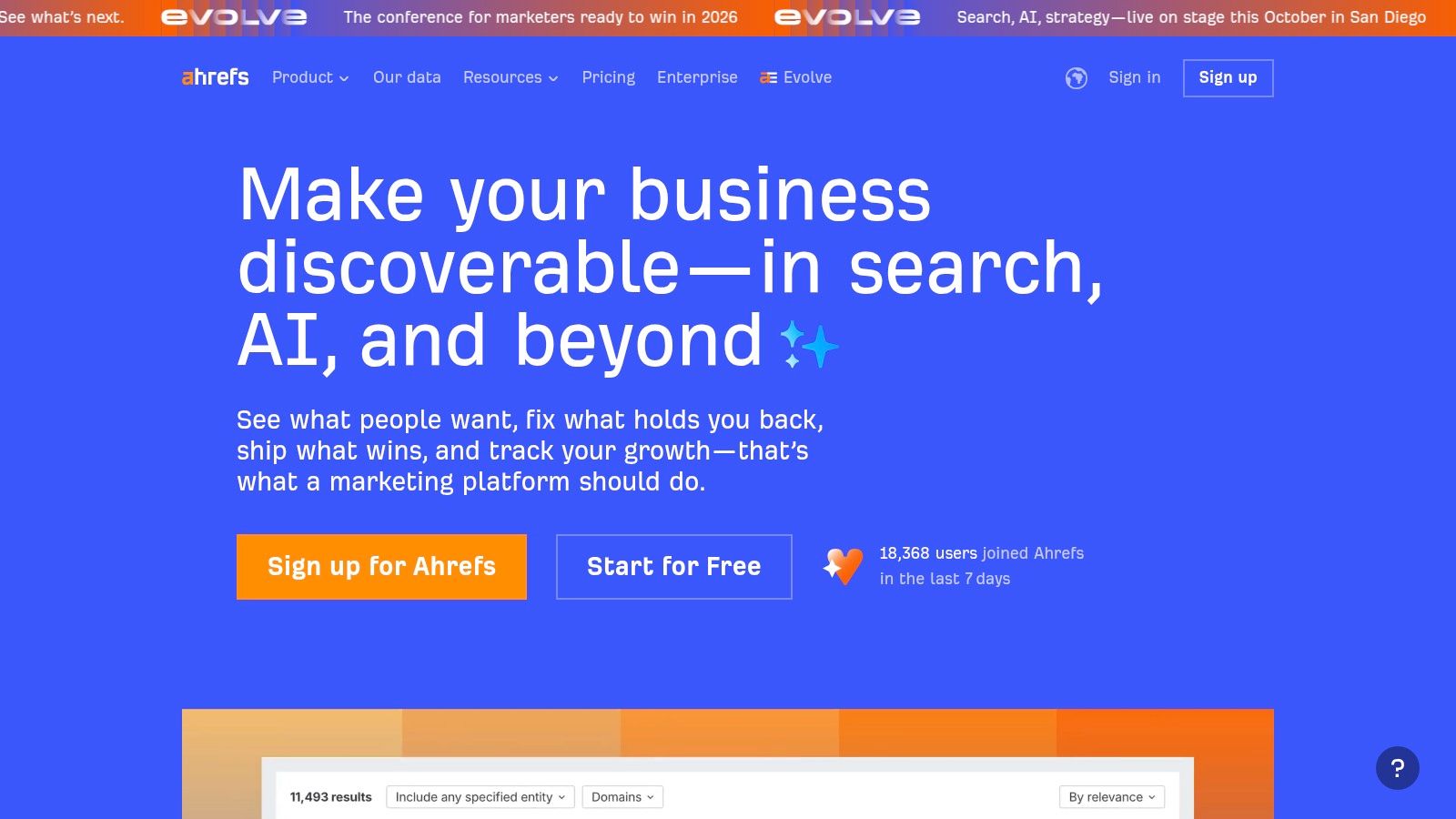
Key Features & Use Case
Ahrefs is among the most accurate AI visibility metrics software because it connects AI mentions directly to foundational SEO data. For instance, a B2B SaaS company can use it to identify which of their blog posts are being used as sources in AI Overviews for high-intent keywords. They can then double down on optimizing those specific pages using Ahrefs’ Site Audit and keyword data to solidify their position as an authoritative source.
- Platform: Web-based SaaS
- Pricing: Plans start at $99/month. AI tracking features like Brand Radar are available as add-ons.
- Best For: SEO managers and digital marketing agencies needing a single platform to track performance across both traditional SERPs and emerging AI search experiences.
| Pros | Cons |
|---|---|
| Integrated view of AI and traditional SEO metrics | AI features are paid add-ons, increasing total cost |
| Fast data refresh from a powerful, large-scale crawler | Advanced data exports require higher-tier plans |
| Expansive AI Overviews coverage & historical data | Daily rank updates can require additional credits |
Website: https://ahrefs.com
3. Semrush
Semrush has integrated AI visibility tracking directly into its vast all-in-one marketing suite. Its strength lies in operationalizing AI search impact within familiar workflows, allowing users to monitor AI Overviews without adopting an entirely new tool.
The platform's core offering is the enhancement of its Position Tracking tool to include AI Overviews and AI Mode visibility. This allows you to monitor your domain's presence in generative AI answers alongside traditional organic rankings. Semrush also provides the Semrush Sensor, which tracks the volatility of SERPs and reports on the frequency of AI Overviews by industry.
Key Features & Use Case
Semrush is a strong option because it connects AI performance to a wide range of marketing activities. For example, a multi-channel e-commerce brand can use Semrush to see if their PPC landing pages are being cited in AI Overviews for commercial keywords. This insight allows them to adjust both their SEO and paid strategies to capture traffic from generative answers, using data from Keyword Magic Tool and Site Audit to reinforce their authority.
- Platform: Web-based SaaS
- Pricing: Plans start at $129.95/month. AI tracking is integrated into core plans, but certain advanced features may require Guru or Business tiers.
- Best For: Integrated marketing teams that need to track AI visibility as part of a broader digital marketing strategy.
| Pros | Cons |
|---|---|
| Broad visibility across both AI and traditional SERPs | Some AI features are still in beta or have US-only availability |
| Vast toolset suitable for cross-channel marketing | Add-ons and higher-tier plans can become costly for full access |
| Strong adoption with comprehensive learning resources | The sheer number of tools can be overwhelming for new users |
Website: https://www.semrush.com
4. SISTRIX
While many tools are pivoting to AI, SISTRIX remains a stalwart of classic organic search, anchored by its industry-renowned Visibility Index. This KPI is celebrated for its transparent methodology and extensive historical data, offering a gold-standard benchmark for organic performance. Its strength is providing a stable, predictable, and widely trusted metric.
The core of the platform is the Visibility Index, a single score that distills complex ranking data into an easily comparable metric. While SISTRIX doesn't directly track AI Overviews, its precise measurement of core organic rankings provides the foundational data needed to understand which content assets are most likely to be featured in AI-generated answers.
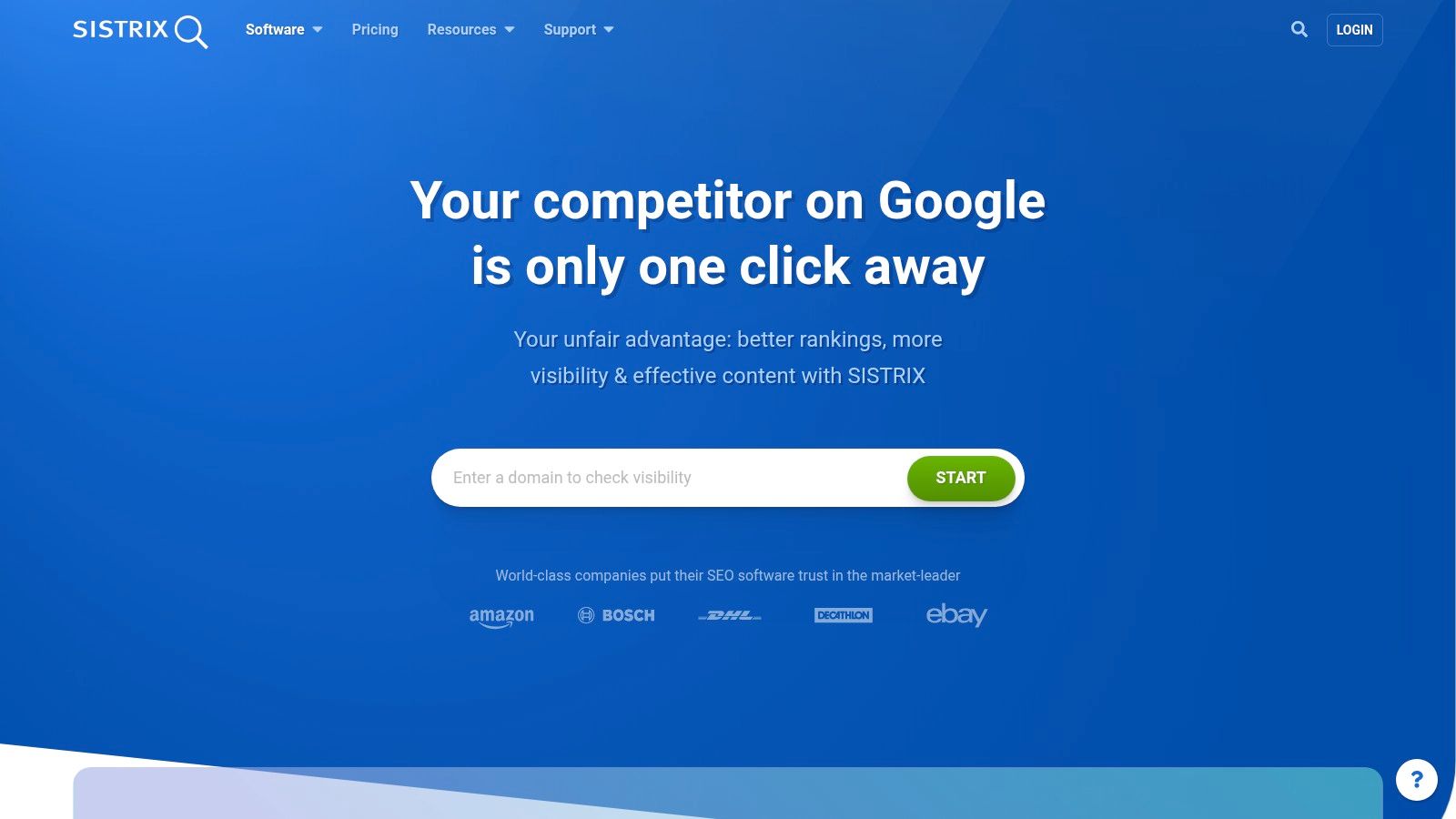
Key Features & Use Case
SISTRIX earns its place not as a direct AI visibility tool, but as an essential foundational one. Its data shows you what Google already considers authoritative. For example, a content team can use the Visibility Index to identify their highest-performing informational pages. These pages are prime candidates for optimization to be sourced by AI, as they have already established strong organic signals of trust and relevance.
- Platform: Web-based SaaS
- Pricing: Plans start at approximately $109/month (€99/month). A free limited version is available.
- Best For: SEO professionals who require a stable, long-term benchmark for organic visibility and need to diagnose the root causes of performance changes.
| Pros | Cons |
|---|---|
| Widely benchmarked and transparent KPI methodology | Does not currently offer specific AI Overview metrics |
| Robust historical datasets covering multiple countries | Visibility for smaller niches may require custom projects |
| Strong competitor benchmarking visuals and reporting | Interface can be complex for beginners |
Website: https://www.sistrix.com
5. BrightEdge
BrightEdge positions itself as an enterprise-grade SEO and AI search platform built for large brands that require robust, real-time monitoring. It combines deep AI Overviews analytics with automated, scalable workflows tailored to complex organizations.
The platform's strength is its unified approach, using its Data Cube X and AI Catalyst features to deliver comprehensive AI-era visibility analytics. This allows users to track their footprint in AI Overviews and gather AI prompt intelligence. BrightEdge provides detailed research reports on AI prevalence trends, helping enterprise teams make data-driven strategic decisions.
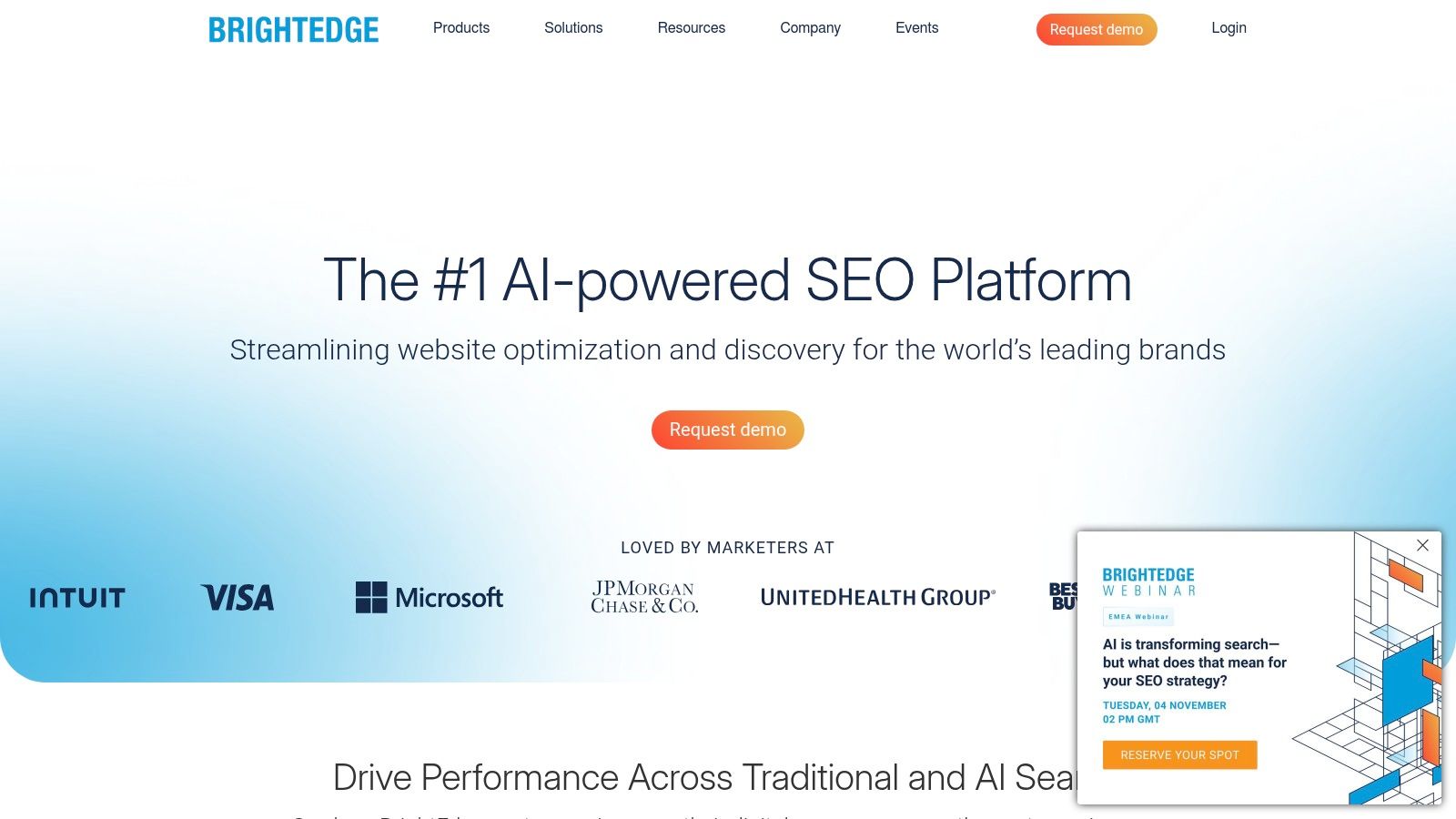
Key Features & Use Case
BrightEdge is designed for organizations that need more than just tracking; they need integrated workflows. For example, a global financial services company can use the platform to monitor how its various service pages are being cited in AI Overviews for critical financial keywords. They can then use BrightEdge’s automation to assign optimization tasks to specific content teams and track the impact.
- Platform: Web-based SaaS
- Pricing: Custom enterprise-level pricing.
- Best For: Large enterprise marketing teams that require extensive data, automation, governance, and dedicated support for managing their AI search presence.
| Pros | Cons |
|---|---|
| Built specifically for large enterprises with extensive data | Pricing is custom and generally high, making it inaccessible for smaller businesses |
| Strong focus on AI-search with ongoing research and innovation | Implementation and onboarding require significant time and resources |
| Robust governance and reporting designed for enterprise needs | The platform can be complex for teams without dedicated SEO expertise |
Website: https://www.brightedge.com
6. Conductor
Conductor is an enterprise-grade platform that moves beyond traditional SEO to what it calls "AI-enabled SEO." Its core strength is providing a unified solution that combines AI-driven content creation, sophisticated search intelligence, and continuous website monitoring.
The platform's standout feature is its AI Search Performance product, which offers deep insights into visibility within large language models like Google's Gemini. It goes beyond simple mention tracking by providing AI bot crawl analytics, allowing teams to understand how their site is being consumed by AI systems.
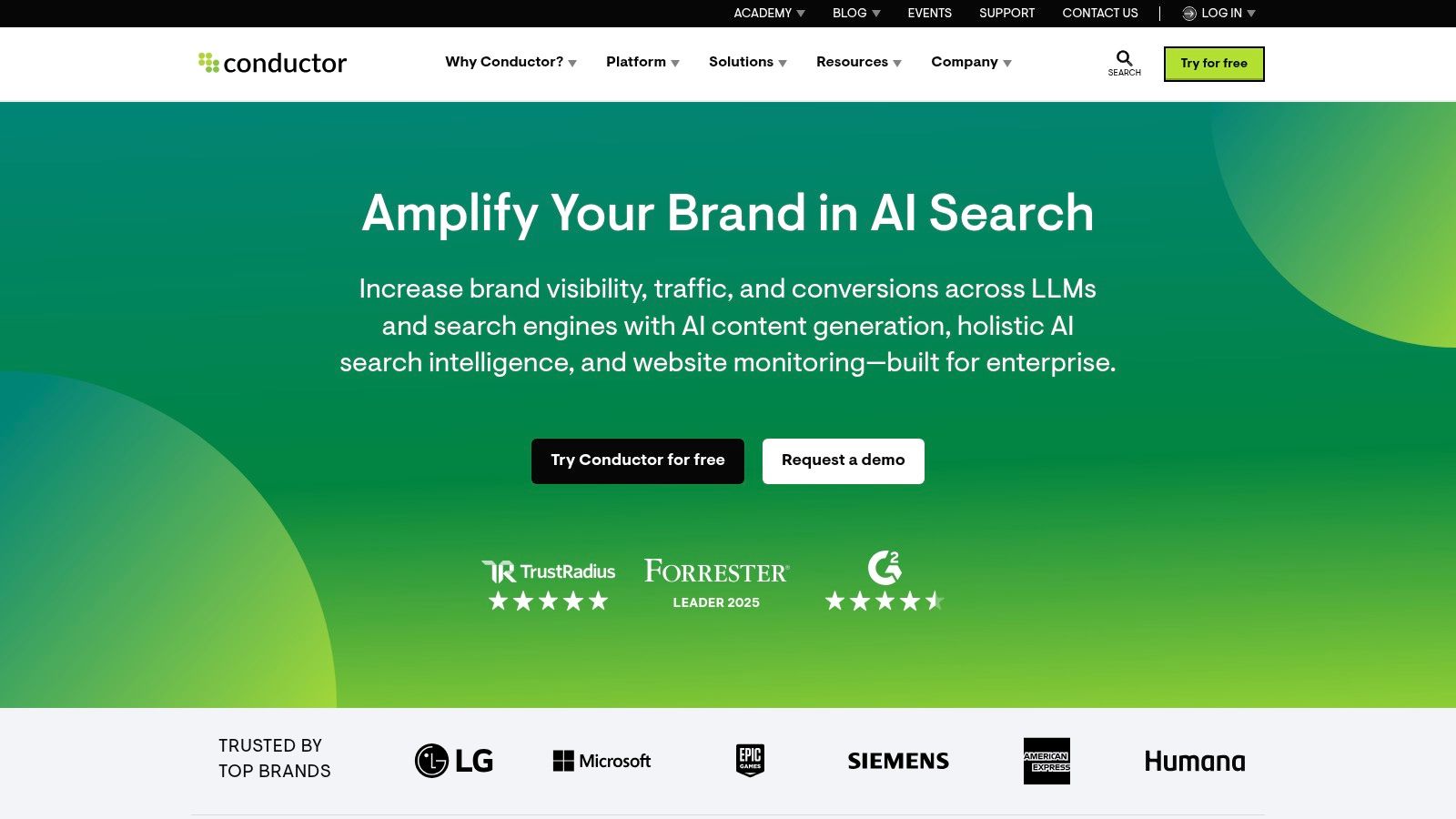
Key Features & Use Case
Conductor is among the most accurate AI visibility metrics software because of its enterprise-focused features that ensure content governance. For example, a global financial services company can use the AI Content Score to ensure its AI-generated content remains compliant and on-brand, while tracking how its key service pages are being cited in Gemini for high-value queries.
- Platform: Web-based SaaS
- Pricing: Pricing is not publicly available and is tailored for enterprise clients.
- Best For: Large enterprise marketing teams and regulated industries that require a comprehensive, secure platform for managing content and visibility.
| Pros | Cons |
|---|---|
| Features purpose-built for AI visibility & content | Pricing not publicly available; tends to be high |
| Strong enterprise credentials and frequent updates | Best suited for enterprise-scale deployments |
| Offers free trials and valuable public resources | May be overly complex for smaller teams or SMBs |
Website: https://www.conductor.com
7. Botify
Botify is an enterprise-grade SEO and AI agentic platform focused on deep technical foundations. Its approach is built on optimizing how search engine and AI crawlers discover, render, and index massive websites.
The platform's core differentiator is its Log File Analysis, which provides direct visibility into how various AI bots, like Google's and OpenAI's, interact with a website. This data reveals crawl frequency, budget consumption, and rendering issues specific to AI agents. By connecting crawl data to content performance, Botify allows technical SEOs to automate critical workflows like indexation management.
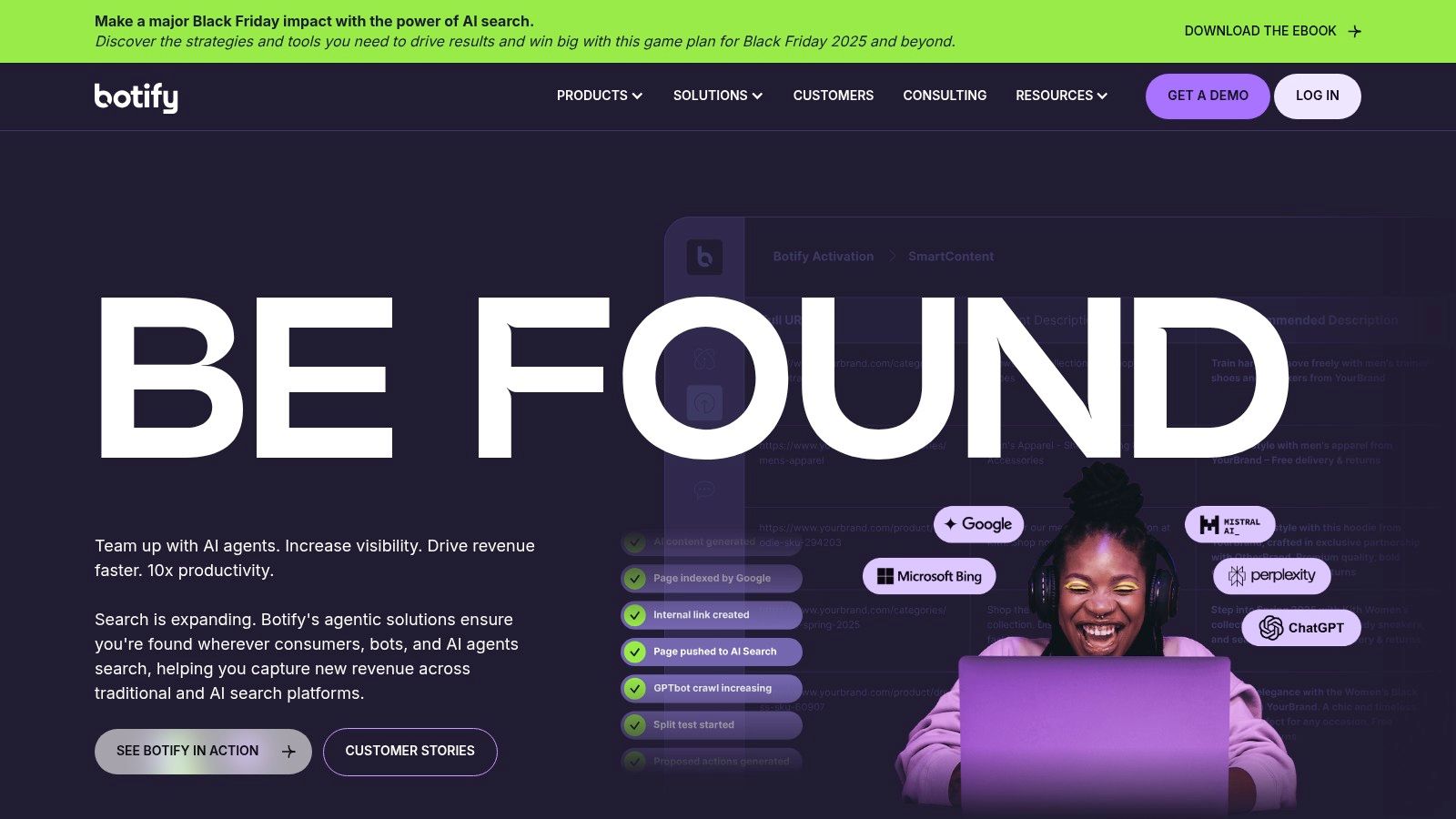
Key Features & Use Case
Botify addresses visibility at the source: crawler accessibility. For example, a large e-commerce site with millions of product pages can use Botify to identify which product categories are under-crawled by AI bots. Using the platform's automation suite, they can then prioritize crawl budget for high-margin products, ensuring they are available to be included in AI-generated product recommendations.
- Platform: Web-based SaaS
- Pricing: Custom enterprise pricing, suited for large-scale websites.
- Best For: Enterprise SEO teams managing large, complex websites who need to optimize for discovery by both traditional and AI crawlers.
| Pros | Cons |
|---|---|
| Deep technical visibility into AI bot behavior | Pricing is custom and typically only for large sites |
| Strong enterprise track record with analyst recognition | Technical implementation may require developer collaboration |
| Designed specifically to optimize AI and traditional bot discovery | The platform has a steeper learning curve for non-technical users |
Website: https://www.botify.com
8. seoClarity
seoClarity offers an enterprise-grade SEO platform that integrates traditional search metrics with AI-driven analytics. Its strength is in massive-scale data processing and customizable reporting, making it suitable for large organizations managing complex digital footprints.
The platform’s unique "Visibility Share" metric is a standout feature, visually representing a domain's market share in the SERPs against competitors, including AI-generated results. This is paired with powerful tools like Research Grid and Content Fusion, which help teams not only track their AI visibility but also create content engineered to be cited by AI models.
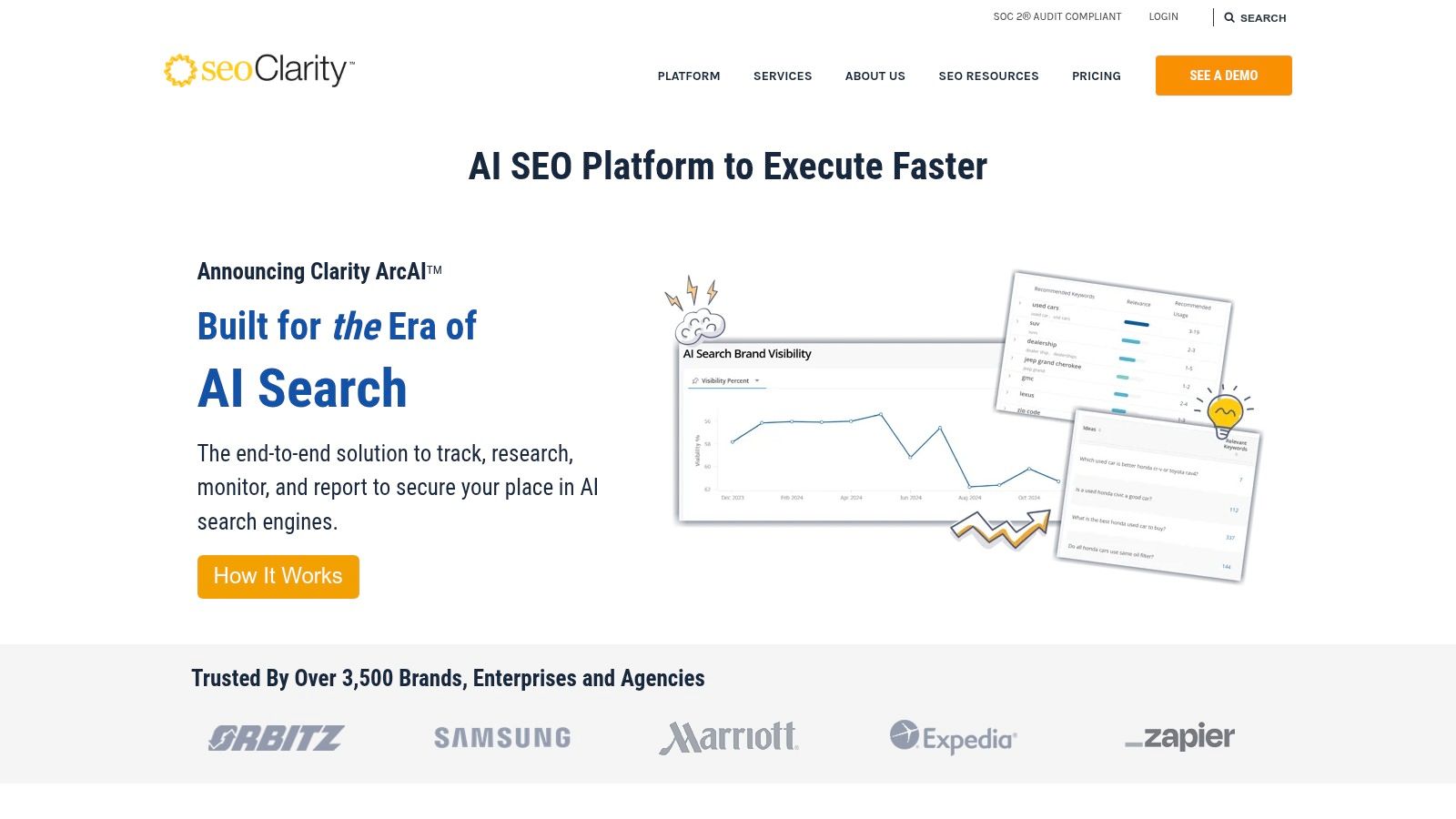
Key Features & Use Case
seoClarity combines immense data scale with actionable AI-powered content workflows. For example, a global e-commerce brand can use the platform's daily rank tracking across thousands of keywords to identify where AI Overviews are impacting their organic traffic. They can then use Content Fusion to re-optimize those product pages with semantic recommendations, improving their chances of being sourced in future AI answers.
- Platform: Web-based SaaS
- Pricing: Enterprise-level pricing varies based on the volume of domains, keywords, and add-on features.
- Best For: Large enterprise SEO teams and global brands that require extensive, customizable data and integrated AI content optimization workflows.
| Pros | Cons |
|---|---|
| Transparent enterprise pricing with clear entry points | Total cost varies based on domain/keyword volume |
| Integrates technical, content, and rank data in one ecosystem | Platform can have a steep learning curve for smaller teams |
| Strong customer service and onboarding support | Advanced features may be overkill for non-enterprise users |
Website: https://www.seoclarity.net
9. Similarweb
Similarweb is a competitive intelligence platform, offering a macro view of digital market share that extends beyond simple rank tracking. Its strength is in providing high-level traffic and engagement data, now enhanced with AI-powered insights to help teams understand their overall market position.
The platform's unique offering is its ability to blend domain-level traffic analytics with broader SERP and ad tracking. For advanced users, Similarweb offers AI agents and custom insights that can analyze market trends and competitor behavior at scale. This allows teams to benchmark their performance not just on keywords but on overall share of voice. Understanding this competitive landscape is a key step in calculating a brand's share of voice.
Key Features & Use Case
Similarweb is one of the most accurate ai visibility metrics software options for competitive benchmarking. A B2C e-commerce brand, for example, could use its web intelligence tools to see which channels drive the most traffic for top competitors. By layering on AI insights, they can identify emerging traffic sources or shifts in consumer search behavior.
- Platform: Web-based SaaS
- Pricing: Freemium domain lookups and a free trial are available. Paid plans provide deeper data access and AI features.
- Best For: SEO and PPC teams in competitive markets who need to benchmark against rivals and understand holistic market share and traffic dynamics.
| Pros | Cons |
|---|---|
| Holistic market overview beyond individual site data | Does not fully replace dedicated rank tracking tools |
| Transparent pricing for self-serve plans | Data granularity and historical depth vary by plan |
| Strong US market competitor benchmarking capabilities | AI insights are limited to higher-tier subscriptions |
Website: https://www.similarweb.com
10. Moz Pro
Moz Pro, a long-standing pillar of the SEO community, has integrated AI search tracking into its robust toolkit. Its strength lies in presenting complex SEO data, including AI visibility, in a straightforward and actionable way. This makes it particularly well-suited for small to mid-sized teams.
The core of its AI tracking is a simple yet effective AI Overviews indicator within its Campaign and Rank Tracker tools. This feature flags when Google’s AI is present for your tracked keywords, allowing you to quickly identify where AI is impacting your traditional SERP visibility.
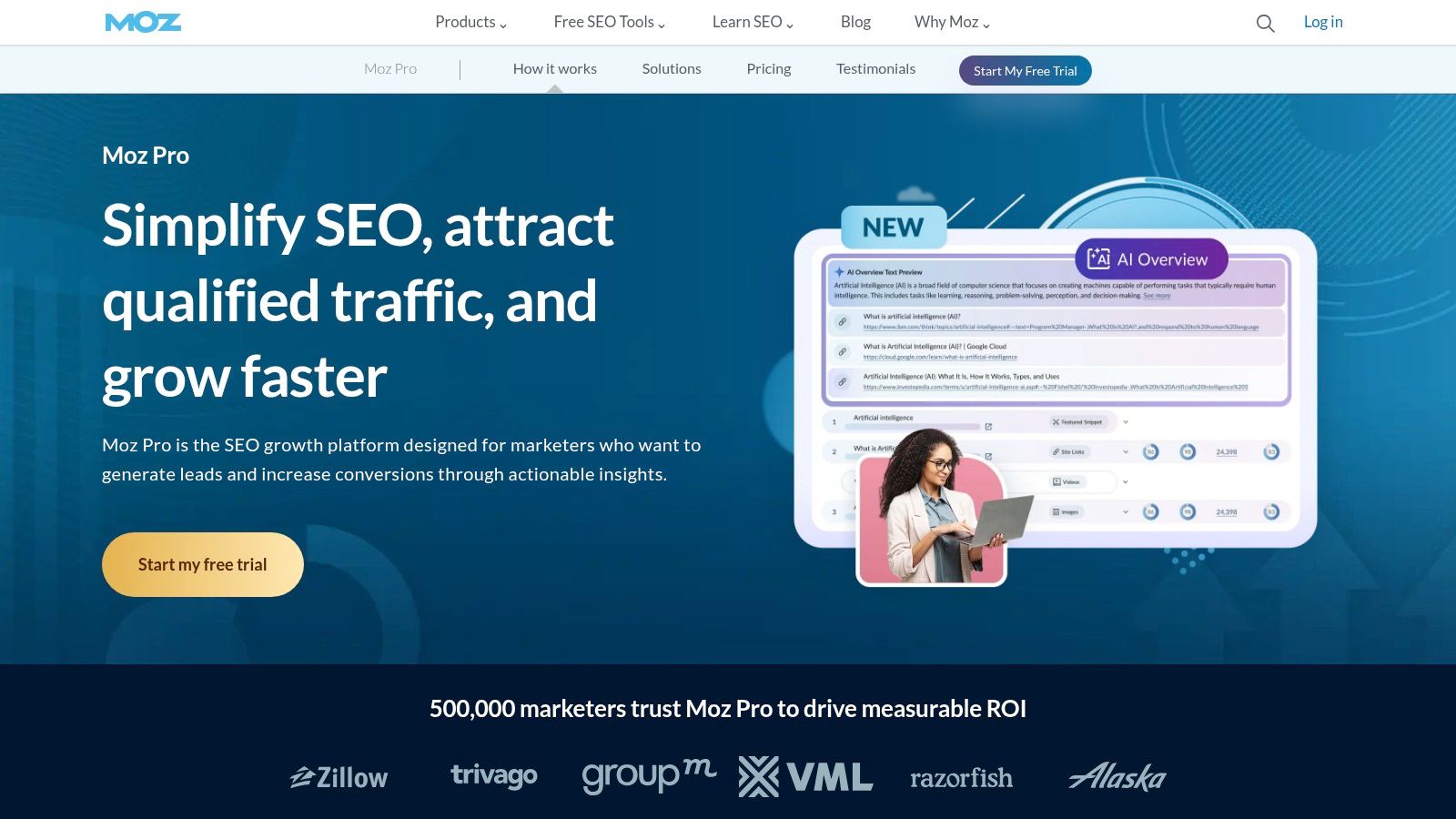
Key Features & Use Case
Moz Pro is a solid choice for businesses seeking an all-in-one, user-friendly solution. For example, a local service business can use Moz Pro to track high-value local keywords. When they see the AI Overviews indicator appear, they can analyze the SERP, use Moz's keyword and on-page tools to refine their content, and aim to be included as a source, all within one unified interface.
- Platform: Web-based SaaS
- Pricing: Plans start at $99/month, with AI Overviews tracking included. A 30-day free trial is available.
- Best For: Small to medium-sized businesses and SEO professionals who need a foundational, integrated toolkit that includes both traditional SEO and essential AI Overviews tracking.
| Pros | Cons |
|---|---|
| Clear and affordable pricing tiers with a free trial | Supports fewer AI search platforms than enterprise suites |
| Excellent documentation and community support | Lacks deep-source analysis for AI-generated answers |
| Provides useful brand authority metrics to complement visibility | Enterprise-scale tracking may require its separate STAT tool |
Website: https://moz.com/products/pro
11. AccuRanker
AccuRanker is a premium, high-speed rank tracker that now applies that same precision to generative AI. The platform is built for teams that demand immediate and precise data, offering specialized LLM tracking for Google AI Overviews and ChatGPT. Its key differentiator is its focus on forecasting, using AI-driven models to predict click-through rates and search volume in this new landscape.
The platform provides dedicated metrics like AI Overview Page and AI Share of Voice, which go beyond simple citation tracking. These features allow agencies and enterprise clients to quantify their visibility within AI-generated results with a high degree of granularity.
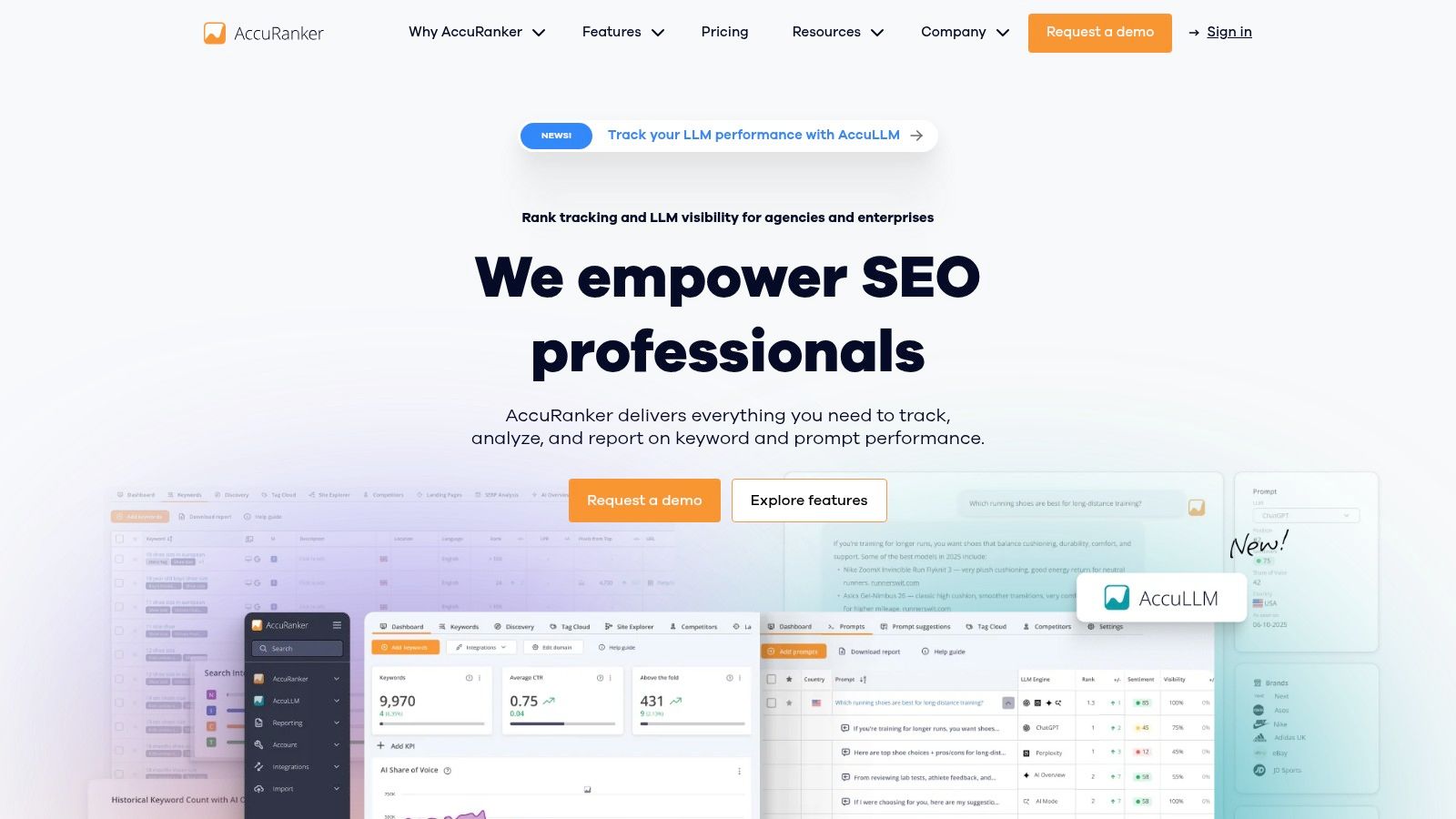
Key Features & Use Case
AccuRanker is one of the most accurate AI visibility metrics software solutions because of its laser focus on speed and data integrity for generative AI.
-
Mini Case Study: An e-commerce brand used its forecasting models to estimate the traffic impact of gaining a mention in an AI Overview for a major product category. The data showed a projected 15% CTR lift. This allowed them to prioritize optimizing keywords for AI based on projected ROI, not just current search volume, and justify the required content budget to leadership.
-
Platform: Web-based SaaS
-
Pricing: Plans are based on keyword volume, starting from $129/month for 1,000 keywords. A 14-day free trial is available.
-
Best For: Agencies and enterprise SEO teams that require fast, accurate, and scalable rank tracking with advanced metrics for AI Overviews and other LLMs.
| Pros | Cons |
|---|---|
| Daily updates with on-demand refresh for real-time data | Costs can scale steeply with a high volume of keywords |
| Strong focus on advanced AI and LLM visibility metrics | Designed as a dedicated rank tracker, not an all-in-one SEO suite |
| Transparent pricing based on tracked keyword volume | Lacks broader SEO tools like backlink analysis or site audits |
Website: https://www.accuranker.com
12. Searchmetrics
Searchmetrics is an enterprise platform known for its robust "SEO Visibility" metric, a proprietary score that benchmarks organic search performance. While it has traditionally focused on classic SERPs, its powerful data infrastructure provides a stable foundation for understanding market share and visibility trends that indirectly inform AI search strategy.
Its core strength is the SEO Visibility score, which models a website’s presence across a vast keyword index. While not a direct AI tracking tool, this metric helps identify the high-authority pages and topics that are most likely to be sourced by AI models. This allows teams to benchmark their foundational strength against competitors.
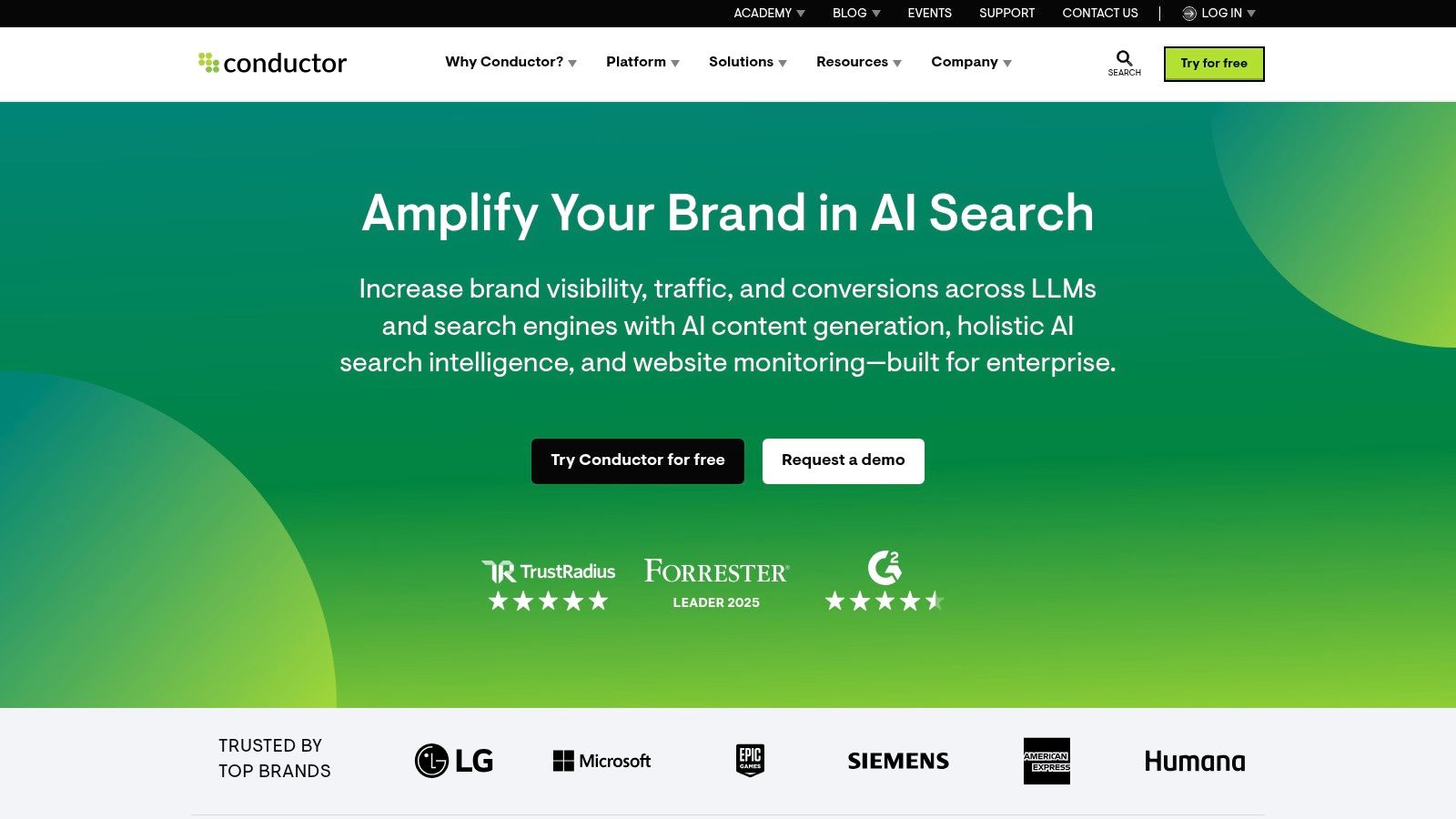
Key Features & Use Case
While not a primary AI tracker, Searchmetrics is a strong choice for foundational analysis. A global e-commerce enterprise, for instance, can use the platform's historical visibility data across 30 countries to see which product categories have the strongest organic footprint. This insight reveals which content assets are prime candidates for AI sourcing and guides their content strategy to reinforce that authority.
- Platform: Web-based SaaS
- Pricing: Enterprise-level pricing only; not publicly disclosed.
- Best For: Large enterprises and international marketing teams needing a mature, stable KPI to benchmark overall search visibility and identify top-performing content at scale.
| Pros | Cons |
|---|---|
| Widely used, mature KPI for SEO visibility trend analysis | Less transparent AI assistant or overview feature coverage |
| Strong multi-country benchmarking support | Pricing is enterprise-only and not publicly disclosed |
| Complements rank tracking and traffic reporting | Slower to adopt dedicated AI-specific tracking tools |
Website: https://www.searchmetrics.com
Compare the Top 12 AI Visibility Metrics Tools
| Platform | Core Focus | Best For | Key Tradeoff |
|---|---|---|---|
| AI SEO Tracker 🏆 | Direct LLM citation tracking | SaaS & B2B marketing teams | Specialized, less traditional SEO data. |
| Ahrefs | Unified AI & traditional SEO tracking | SEO pros needing one tool | AI features are paid add-ons. |
| Semrush | All-in-one marketing suite with AI data | Integrated marketing teams | Can be overwhelming; costs add up. |
| SISTRIX | Foundational organic visibility (KPI) | SEO analysts needing a benchmark | No direct AI tracking. |
| BrightEdge | Enterprise-scale AI & SEO automation | Fortune 500 companies | High cost and complexity. |
| Conductor | Enterprise AI content & governance | Regulated industries | High cost; enterprise focus. |
| Botify | Technical crawling by AI bots | Large, complex websites | Requires technical expertise. |
| seoClarity | Enterprise data & AI content workflows | Global brands | Can be complex for smaller teams. |
| Similarweb | Competitive market intelligence | Market analysts, PPC/SEO teams | Not a dedicated rank tracker. |
| Moz Pro | Accessible, all-in-one SEO with AI flags | Small to medium businesses (SMBs) | Lacks deep-source AI analysis. |
| AccuRanker | Fast, accurate AI & SERP rank tracking | Agencies needing speed & precision | Not an all-in-one SEO suite. |
| Searchmetrics | Foundational visibility score | International enterprises | Slower to adopt new AI features. |
Your Next Move: From Measuring to Winning
The landscape has changed. Visibility is no longer about ranking #1 in a list of blue links; it's about becoming a cited source within AI-generated answers.
If you aren't visible to the AI, you're becoming invisible to your customer.
Navigating this requires a new toolset. While traditional SEO platforms like Semrush and Ahrefs are adapting, they were built for a different era. Specialized tools are built from the ground up to answer one critical question: "Is my brand being mentioned by AI?" This distinction is the core of your decision.
Synthesizing the Data: Key Takeaways
Accuracy in AI visibility is not a monolithic concept. A tool can be highly accurate at tracking traditional keyword rankings but offer little insight into your presence in a Perplexity answer. Choosing the most accurate ai visibility metrics software depends entirely on what you are trying to measure.
- For Direct LLM Answer Tracking: If your primary goal is to see if your brand is mentioned in responses from ChatGPT, Perplexity, and Gemini, a dedicated tool is non-negotiable.
- For Broader AI-Influenced SERPs: If your focus is on winning Featured Snippets and People Also Ask boxes, comprehensive suites like Semrush or SISTRIX offer robust tracking.
- For Enterprise-Scale Integration: Large organizations will find platforms like BrightEdge and Conductor valuable for integrating visibility data with broader business intelligence.
From Insights to Action: A 3-Step Plan
Having the right data is the first step. Acting on it is the advantage.
Here are your immediate next steps:
-
Select Your Single Source of Truth. Pick one platform for AI visibility monitoring. Jumping between different dashboards creates confusion. For direct LLM answer tracking, a specialized tool offers the most focused insights.
-
Establish a Competitive Baseline. You cannot measure progress without a starting point. Run an initial report on your top five competitors across ten of your most important commercial-intent queries. Document this baseline meticulously.
-
Execute Your First 'Unseen' Content Win. Use a tool that can analyze how AI models parse your content. Find one high-value page that is likely being misread by LLMs due to complex JavaScript or content hidden in accordions. Fixing this one "unseen" gap is your first tangible victory.
Your competitors are likely still obsessed with the old game of blue links. By focusing on winning citations inside AI-generated answers, you are playing a more advanced game. This gives you a powerful, and for now, largely unseen advantage. The time to start tracking is now.
Ready to stop guessing and start measuring your visibility in the AI era? AI SEO Tracker is a focused platform for tracking your brand's presence directly within AI chatbot answers. See exactly where you stand with a platform built specifically to find the most accurate ai visibility metrics software for this new search landscape. Start your trial at AI SEO Tracker today.

